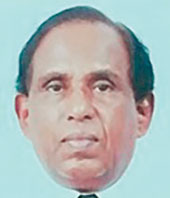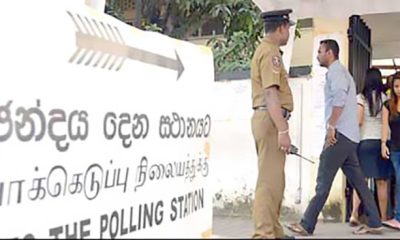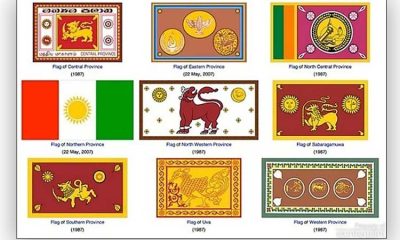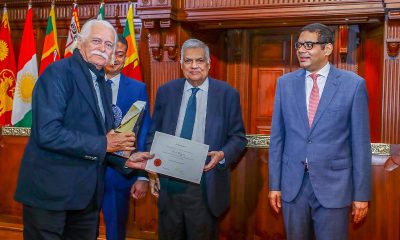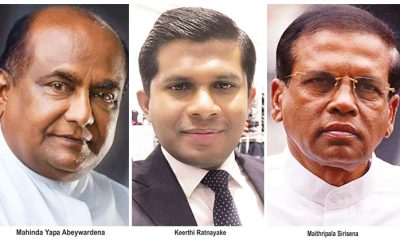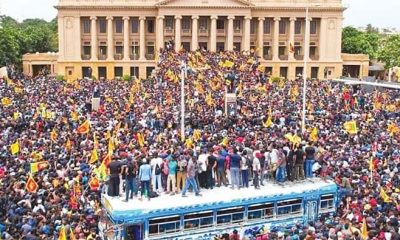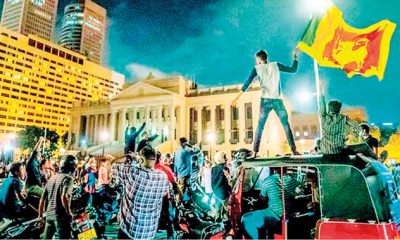Features
How to motivate foreign direct investment to Sri Lanka

by WA de Silva
Former Executive Director BOI
What are the strategies adopted to attract and obstacles which hinder smooth flow of FDI to Sri Lanka?
The Board of Investment of Sri Lanka (BOI) is the principal agent of the Government entrusted with the responsibility of promoting facilitating and maintenance of Foreign Direct Investments (FDI) based on Board of Investment Law No. 04 of 1978, Strategic Development Act No. 14 of 2008 and subsequent amendments thereto. The Greater Colombo Economic Commission (GCEC) was the predecessor to the Board of Investment. Government has already proposed to establish a Sri Lanka Economic Commission over and above BOI as an apex body on FDI.
The package of incentives currently being used by the BOI for attracting FDI is as follows. FDI projects approved under section 17 of BOI Law No. 04 of 1978 are granted exemptions from laws specified in Schedule “B” of the Law which encompassed the Inland Revenue Act, Customs Ordinance, Exchange Control Act, Companies Ordinance, Merchant Shipping Act, Finance Act, Air Navigation Act, Excise Act, Value Added Tax Act, Economic Service Charges Act, Debt Tax Act etc. subject to the regulations issued by Minister concerned from time to time.
The FDI projects approved under Section 02 of the Strategic Development Project Act No. 14 of 2008 are also granted exemptions from laws specified in the Schedule thereto and further concessions recommended by Minister concerned subject to the approval of Cabinet of Ministers and Parliament. However it may be noted that exemptions given under Schedule B of BOI Law No. 04 of 1978 could be changed, adjusted or revoked by regulations gazetted by Minister in Charge of FDI from time to time subject to prior approval of Cabinet of Ministers. In that context exemptions given to FDI projects are vulnerable to change of Governments and change of the mindset of the politicians who hold Governmental power.
In this context it has become necessary to enact a comprehensive national Policy on FDI covering at least a period of 10 years to avoid abrupt changes of FDI Policy due to whims and fancies of political authorities who hold governmental power.
Article 157 of the Constitution of Sri Lanka provides guarantees for FDI project agreements entered into with BOI. It states inter alia “any Treaty or Agreement between the Government of Sri Lanka and the Government of any foreign State for the promotion and protection of the investments in Sri Lanka of such foreign State, its nationals or of corporations, companies and other associations incorporated or constituted under its laws such treaty or agreement shall have the force of law in Sri Lanka and otherwise than in the interests of national security, no written law shall be entered or made, and no executive or administrative action shall be taken in contravention of the provisions of such Treaty or Agreement”.
The very intention of this Article in the Constitution is to provide stability, promote, foster and protect FDI in Sri Lanka. However it has been observed, this law has been distorted by way of imposing various taxes, levies and cesses which violate free of duty concessions for exports and import of raw materials and project related items given under BOI Agreements/ Such provisions under Section 17 of BOI Law No. 04 of 1978 are allowd to FDI projects due to the fact that those levies and cesses are considered another kind of tax in disguise. PAL (Port Authority Levy) and EIC (Export Import Cess) could be cited as clear examples in this regard.
FDI projects are further benefited by bilateral investment promotion Agreements, double Tax Avoidance Agreements and Free Trade Agreements that Sri Lanka Government has entered into with some selected countries. However due to political protests, Governments couldn’t complete the proposed number of projects. In case of Free Trade Agreements it is necessary to balance the impact of imports and exports between Sri Lanka and the other party to the Agreement and ensure it is in favour of Sri Lanka.
Availability of skilled and trainable workforce, emerging prospects of being a logistic and trading hub of the region consequent to the promulgation of Port City, restoration of peace after eradication of terrorism and the Covid-19 pandemic situation, are considered plus factors for attracting of FDI. However, various negative factors in this process should be arrested to make the positives effective.
There are some procedural obstructions in the process of expediting FDI inflow at present such as clearance required from several Departments and institutions in terms of Tax Laws, Land Laws, Exchange Control Laws, Customs Laws, Labour Laws, Environmental Laws, Laws on Archeology etc. prior to finalizing approval for FDI projects. The one-stop-shop concept and Cabinet Sub-Committee on Investment were established to resolve this problem. However this arrangement did not last long and work satisfactorily due to the adverse impact of political instability of the country and lack of genuine dedication by agencies who participate in this program.
Provisions in some Labour Laws such as Trade Union Ordinance, Factory Ordinance, Holidays Act, Industrial Disputes Act, Termination of Employment Act etc. are impediments to FDI. This is due to abuse of those laws by politicized trade unions to secure their self-interest. Strikes, violent protests, work to rule campaigns and even so called Aragalaya launched by several Trade Unions in the public sector and the private sector, more specifically in Export Processing Zones, could be cited as glaring instances of discouraging prospective FDI Projects intended for Sri Lanka and FDI projects already here. Sabotage of FDI Projects and discouraging of FDI inflows to the country are considered hidden objectives behind those strikes. The law and order issues emerging from time to time due to politicized strikes have been deterrents to attracting FDI.
Certain provisions in prevalent Labour Laws here hinder smooth functioning and production flow of FDI Projects in Export Processing Zones. Several mechanisms such as adjudication, mediation, conciliation, arbitration, negotiation through collective bargaining to resolve industrial disputes exist. But harmful trade union actions such as work-to-rule, go-slow, politicized strikes, general strikes etc.
occur as there is no legal provision in any of those enactments to make it mandatory for trade unions to choose a mechanism more peaceful and beneficial for both parties (employers and employees) such as peaceful negotiations, collective bargaining etc. in the process of resolving industrial disputes. It is necessary to amend Labour Laws eliminating these to create a peaceful labour environment conducive for FDI.
The irresponsible conduct of those who are in the forefront of disseminating negative information over the world against Governments in power have demoralized prospective foreign investors to a considerable extent. Instability they create within the country has obstructed peaceful environment required for FDI on the one hand and tarnishing image of the country tends to demoralize prospective investors on the other.
The ongoing economic crisis and government’s bankruptcy declaration have made prospective investors look for alternative destinations such as Bangladesh, Vietnam, Maldives, Malaysia etc. to invest in. The government is now in the process of sorting out the economy. In that process it is necessary to secure active co-operation and support of political parties in the Opposition.
Political interference in State Owned Enterprises (SOEs) is common. Such interference is not uncommon in the BOI as well retarding its efficiency to some extent. The BOI leadership must handle such pressure in the manner adopted by first Chairman/Director General of GCEC/BOI Upali Wijewardena. There have been occasions in the past where the BOI was compelled to launch several projects non-viable in the long-run at public cost as alternative to FDI due to political pressure. The classic example in this regard is the 200 garment factories project and Mihintale Gamudawa sponsored by BOI at a tremendous cost. These projects do not exist at present.
FDI targets set should be realistic and achievable. The concerned authorities should take relevant global and local situations into account in approving projects. The practice of fixing targets based on political ambitions disregarding the reality of global and local situations should be arrested due to the fact that such targets are not realistic and hence unachievable.
The BOI’s Research Department claims that the following FDI targets for the years 2022 and 2023 were achieved.
This achievement is commendable in the context of the ongoing political and economic crisis and other impediments referred to above which hindered FDI flow. These obstacles obviously are beyond BOI control.
The Government has decided to enact an Investment Act to be the governing law for the proposed Sri Lanka Economic Commission (SLEC). The functions of BOI and Export Development Board would be merged and placed under SLEC. In addition it has been decided to establish Sector Specific Advisory Councils (SSAC) to seek expertise from private and public sectors for attraction and retention of FDI in Sri Lanka.
This program would definitely be an effective solution to the institutional structural and procedural deficiencies in attracting FDI into Sri Lanka. However it will not be a solution to the ongoing political and economic instability in this country which is the main obstacle to attracting and promoting FDI.
Whilst clearing these obstacles, it is necessary to make present incentive package for FDI Projects more attractive and competitive when compared to the packages offered by our competitors in the region. It is necessary to obtain expertise of internationally recognized professionals in this regard and also to make funds available for that purpose.
Lack of sufficient fund allocation to provide maintenance and update infrastructure facilities required for FDI in the Export Processing Zones should be resolved.
It may be noted that it is extremely difficult if not impossible to accelerate FDI flow in Sri Lanka without political and economic stability here. Political and economic instability is the outcome of divisive politics exercised by political parties and affiliates based on their self-centered agendas disregarding the national interest. Resolution of this problem is absolutely necessary in the process of promoting FDI.
(The writer is a retired executive director of the BOI who holds an MBA from the SJU following his first BA (Special) degree from the University of Ceylon in 1967. He has served as a consultant on various Human Resource Management and Development programs and also lectured at the American College of Higher Studies. He’s been a management consultant to a multinational group of FDI companies from 2006 to date)
Features
The heart-friendly health minister

by Dr Gotabhya Ranasinghe
Senior Consultant Cardiologist
National Hospital Sri Lanka
When we sought a meeting with Hon Dr. Ramesh Pathirana, Minister of Health, he graciously cleared his busy schedule to accommodate us. Renowned for his attentive listening and deep understanding, Minister Pathirana is dedicated to advancing the health sector. His openness and transparency exemplify the qualities of an exemplary politician and minister.
Dr. Palitha Mahipala, the current Health Secretary, demonstrates both commendable enthusiasm and unwavering support. This combination of attributes makes him a highly compatible colleague for the esteemed Minister of Health.
Our discussion centered on a project that has been in the works for the past 30 years, one that no other minister had managed to advance.
Minister Pathirana, however, recognized the project’s significance and its potential to revolutionize care for heart patients.
The project involves the construction of a state-of-the-art facility at the premises of the National Hospital Colombo. The project’s location within the premises of the National Hospital underscores its importance and relevance to the healthcare infrastructure of the nation.
This facility will include a cardiology building and a tertiary care center, equipped with the latest technology to handle and treat all types of heart-related conditions and surgeries.
Securing funding was a major milestone for this initiative. Minister Pathirana successfully obtained approval for a $40 billion loan from the Asian Development Bank. With the funding in place, the foundation stone is scheduled to be laid in September this year, and construction will begin in January 2025.
This project guarantees a consistent and uninterrupted supply of stents and related medications for heart patients. As a result, patients will have timely access to essential medical supplies during their treatment and recovery. By securing these critical resources, the project aims to enhance patient outcomes, minimize treatment delays, and maintain the highest standards of cardiac care.
Upon its fruition, this monumental building will serve as a beacon of hope and healing, symbolizing the unwavering dedication to improving patient outcomes and fostering a healthier society.We anticipate a future marked by significant progress and positive outcomes in Sri Lanka’s cardiovascular treatment landscape within the foreseeable timeframe.
Features
A LOVING TRIBUTE TO JESUIT FR. ALOYSIUS PIERIS ON HIS 90th BIRTHDAY

by Fr. Emmanuel Fernando, OMI
Jesuit Fr. Aloysius Pieris (affectionately called Fr. Aloy) celebrated his 90th birthday on April 9, 2024 and I, as the editor of our Oblate Journal, THE MISSIONARY OBLATE had gone to press by that time. Immediately I decided to publish an article, appreciating the untiring selfless services he continues to offer for inter-Faith dialogue, the renewal of the Catholic Church, his concern for the poor and the suffering Sri Lankan masses and to me, the present writer.
It was in 1988, when I was appointed Director of the Oblate Scholastics at Ampitiya by the then Oblate Provincial Fr. Anselm Silva, that I came to know Fr. Aloy more closely. Knowing well his expertise in matters spiritual, theological, Indological and pastoral, and with the collaborative spirit of my companion-formators, our Oblate Scholastics were sent to Tulana, the Research and Encounter Centre, Kelaniya, of which he is the Founder-Director, for ‘exposure-programmes’ on matters spiritual, biblical, theological and pastoral. Some of these dimensions according to my view and that of my companion-formators, were not available at the National Seminary, Ampitiya.
Ever since that time, our Oblate formators/ accompaniers at the Oblate Scholasticate, Ampitiya , have continued to send our Oblate Scholastics to Tulana Centre for deepening their insights and convictions regarding matters needed to serve the people in today’s context. Fr. Aloy also had tried very enthusiastically with the Oblate team headed by Frs. Oswald Firth and Clement Waidyasekara to begin a Theologate, directed by the Religious Congregations in Sri Lanka, for the contextual formation/ accompaniment of their members. It should very well be a desired goal of the Leaders / Provincials of the Religious Congregations.
Besides being a formator/accompanier at the Oblate Scholasticate, I was entrusted also with the task of editing and publishing our Oblate journal, ‘The Missionary Oblate’. To maintain the quality of the journal I continue to depend on Fr. Aloy for his thought-provoking and stimulating articles on Biblical Spirituality, Biblical Theology and Ecclesiology. I am very grateful to him for his generous assistance. Of late, his writings on renewal of the Church, initiated by Pope St. John XX111 and continued by Pope Francis through the Synodal path, published in our Oblate journal, enable our readers to focus their attention also on the needed renewal in the Catholic Church in Sri Lanka. Fr. Aloy appreciated very much the Synodal path adopted by the Jesuit Pope Francis for the renewal of the Church, rooted very much on prayerful discernment. In my Religious and presbyteral life, Fr.Aloy continues to be my spiritual animator / guide and ongoing formator / acccompanier.
Fr. Aloysius Pieris, BA Hons (Lond), LPh (SHC, India), STL (PFT, Naples), PhD (SLU/VC), ThD (Tilburg), D.Ltt (KU), has been one of the eminent Asian theologians well recognized internationally and one who has lectured and held visiting chairs in many universities both in the West and in the East. Many members of Religious Congregations from Asian countries have benefited from his lectures and guidance in the East Asian Pastoral Institute (EAPI) in Manila, Philippines. He had been a Theologian consulted by the Federation of Asian Bishops’ Conferences for many years. During his professorship at the Gregorian University in Rome, he was called to be a member of a special group of advisers on other religions consulted by Pope Paul VI.
Fr. Aloy is the author of more than 30 books and well over 500 Research Papers. Some of his books and articles have been translated and published in several countries. Among those books, one can find the following: 1) The Genesis of an Asian Theology of Liberation (An Autobiographical Excursus on the Art of Theologising in Asia, 2) An Asian Theology of Liberation, 3) Providential Timeliness of Vatican 11 (a long-overdue halt to a scandalous millennium, 4) Give Vatican 11 a chance, 5) Leadership in the Church, 6) Relishing our faith in working for justice (Themes for study and discussion), 7) A Message meant mainly, not exclusively for Jesuits (Background information necessary for helping Francis renew the Church), 8) Lent in Lanka (Reflections and Resolutions, 9) Love meets wisdom (A Christian Experience of Buddhism, 10) Fire and Water 11) God’s Reign for God’s poor, 12) Our Unhiddden Agenda (How we Jesuits work, pray and form our men). He is also the Editor of two journals, Vagdevi, Journal of Religious Reflection and Dialogue, New Series.
Fr. Aloy has a BA in Pali and Sanskrit from the University of London and a Ph.D in Buddhist Philosophy from the University of Sri Lankan, Vidyodaya Campus. On Nov. 23, 2019, he was awarded the prestigious honorary Doctorate of Literature (D.Litt) by the Chancellor of the University of Kelaniya, the Most Venerable Welamitiyawe Dharmakirthi Sri Kusala Dhamma Thera.
Fr. Aloy continues to be a promoter of Gospel values and virtues. Justice as a constitutive dimension of love and social concern for the downtrodden masses are very much noted in his life and work. He had very much appreciated the commitment of the late Fr. Joseph (Joe) Fernando, the National Director of the Social and Economic Centre (SEDEC) for the poor.
In Sri Lanka, a few religious Congregations – the Good Shepherd Sisters, the Christian Brothers, the Marist Brothers and the Oblates – have invited him to animate their members especially during their Provincial Congresses, Chapters and International Conferences. The mainline Christian Churches also have sought his advice and followed his seminars. I, for one, regret very much, that the Sri Lankan authorities of the Catholic Church –today’s Hierarchy—- have not sought Fr.
Aloy’s expertise for the renewal of the Catholic Church in Sri Lanka and thus have not benefited from the immense store of wisdom and insight that he can offer to our local Church while the Sri Lankan bishops who governed the Catholic church in the immediate aftermath of the Second Vatican Council (Edmund Fernando OMI, Anthony de Saram, Leo Nanayakkara OSB, Frank Marcus Fernando, Paul Perera,) visited him and consulted him on many matters. Among the Tamil Bishops, Bishop Rayappu Joseph was keeping close contact with him and Bishop J. Deogupillai hosted him and his team visiting him after the horrible Black July massacre of Tamils.
Features
A fairy tale, success or debacle

Sri Lanka-Singapore Free Trade Agreement
By Gomi Senadhira
senadhiragomi@gmail.com
“You might tell fairy tales, but the progress of a country cannot be achieved through such narratives. A country cannot be developed by making false promises. The country moved backward because of the electoral promises made by political parties throughout time. We have witnessed that the ultimate result of this is the country becoming bankrupt. Unfortunately, many segments of the population have not come to realize this yet.” – President Ranil Wickremesinghe, 2024 Budget speech
Any Sri Lankan would agree with the above words of President Wickremesinghe on the false promises our politicians and officials make and the fairy tales they narrate which bankrupted this country. So, to understand this, let’s look at one such fairy tale with lots of false promises; Ranil Wickremesinghe’s greatest achievement in the area of international trade and investment promotion during the Yahapalana period, Sri Lanka-Singapore Free Trade Agreement (SLSFTA).
It is appropriate and timely to do it now as Finance Minister Wickremesinghe has just presented to parliament a bill on the National Policy on Economic Transformation which includes the establishment of an Office for International Trade and the Sri Lanka Institute of Economics and International Trade.
Was SLSFTA a “Cleverly negotiated Free Trade Agreement” as stated by the (former) Minister of Development Strategies and International Trade Malik Samarawickrama during the Parliamentary Debate on the SLSFTA in July 2018, or a colossal blunder covered up with lies, false promises, and fairy tales? After SLSFTA was signed there were a number of fairy tales published on this agreement by the Ministry of Development Strategies and International, Institute of Policy Studies, and others.
However, for this article, I would like to limit my comments to the speech by Minister Samarawickrama during the Parliamentary Debate, and the two most important areas in the agreement which were covered up with lies, fairy tales, and false promises, namely: revenue loss for Sri Lanka and Investment from Singapore. On the other important area, “Waste products dumping” I do not want to comment here as I have written extensively on the issue.
1. The revenue loss
During the Parliamentary Debate in July 2018, Minister Samarawickrama stated “…. let me reiterate that this FTA with Singapore has been very cleverly negotiated by us…. The liberalisation programme under this FTA has been carefully designed to have the least impact on domestic industry and revenue collection. We have included all revenue sensitive items in the negative list of items which will not be subject to removal of tariff. Therefore, 97.8% revenue from Customs duty is protected. Our tariff liberalisation will take place over a period of 12-15 years! In fact, the revenue earned through tariffs on goods imported from Singapore last year was Rs. 35 billion.
The revenue loss for over the next 15 years due to the FTA is only Rs. 733 million– which when annualised, on average, is just Rs. 51 million. That is just 0.14% per year! So anyone who claims the Singapore FTA causes revenue loss to the Government cannot do basic arithmetic! Mr. Speaker, in conclusion, I call on my fellow members of this House – don’t mislead the public with baseless criticism that is not grounded in facts. Don’t look at petty politics and use these issues for your own political survival.”
I was surprised to read the minister’s speech because an article published in January 2018 in “The Straits Times“, based on information released by the Singaporean Negotiators stated, “…. With the FTA, tariff savings for Singapore exports are estimated to hit $10 million annually“.
As the annual tariff savings (that is the revenue loss for Sri Lanka) calculated by the Singaporean Negotiators, Singaporean $ 10 million (Sri Lankan rupees 1,200 million in 2018) was way above the rupees’ 733 million revenue loss for 15 years estimated by the Sri Lankan negotiators, it was clear to any observer that one of the parties to the agreement had not done the basic arithmetic!
Six years later, according to a report published by “The Morning” newspaper, speaking at the Committee on Public Finance (COPF) on 7th May 2024, Mr Samarawickrama’s chief trade negotiator K.J. Weerasinghehad had admitted “…. that forecasted revenue loss for the Government of Sri Lanka through the Singapore FTA is Rs. 450 million in 2023 and Rs. 1.3 billion in 2024.”
If these numbers are correct, as tariff liberalisation under the SLSFTA has just started, we will pass Rs 2 billion very soon. Then, the question is how Sri Lanka’s trade negotiators made such a colossal blunder. Didn’t they do their basic arithmetic? If they didn’t know how to do basic arithmetic they should have at least done their basic readings. For example, the headline of the article published in The Straits Times in January 2018 was “Singapore, Sri Lanka sign FTA, annual savings of $10m expected”.
Anyway, as Sri Lanka’s chief negotiator reiterated at the COPF meeting that “…. since 99% of the tariffs in Singapore have zero rates of duty, Sri Lanka has agreed on 80% tariff liberalisation over a period of 15 years while expecting Singapore investments to address the imbalance in trade,” let’s turn towards investment.
Investment from Singapore
In July 2018, speaking during the Parliamentary Debate on the FTA this is what Minister Malik Samarawickrama stated on investment from Singapore, “Already, thanks to this FTA, in just the past two-and-a-half months since the agreement came into effect we have received a proposal from Singapore for investment amounting to $ 14.8 billion in an oil refinery for export of petroleum products. In addition, we have proposals for a steel manufacturing plant for exports ($ 1 billion investment), flour milling plant ($ 50 million), sugar refinery ($ 200 million). This adds up to more than $ 16.05 billion in the pipeline on these projects alone.
And all of these projects will create thousands of more jobs for our people. In principle approval has already been granted by the BOI and the investors are awaiting the release of land the environmental approvals to commence the project.
I request the Opposition and those with vested interests to change their narrow-minded thinking and join us to develop our country. We must always look at what is best for the whole community, not just the few who may oppose. We owe it to our people to courageously take decisions that will change their lives for the better.”
According to the media report I quoted earlier, speaking at the Committee on Public Finance (COPF) Chief Negotiator Weerasinghe has admitted that Sri Lanka was not happy with overall Singapore investments that have come in the past few years in return for the trade liberalisation under the Singapore-Sri Lanka Free Trade Agreement. He has added that between 2021 and 2023 the total investment from Singapore had been around $162 million!
What happened to those projects worth $16 billion negotiated, thanks to the SLSFTA, in just the two-and-a-half months after the agreement came into effect and approved by the BOI? I do not know about the steel manufacturing plant for exports ($ 1 billion investment), flour milling plant ($ 50 million) and sugar refinery ($ 200 million).
However, story of the multibillion-dollar investment in the Petroleum Refinery unfolded in a manner that would qualify it as the best fairy tale with false promises presented by our politicians and the officials, prior to 2019 elections.
Though many Sri Lankans got to know, through the media which repeatedly highlighted a plethora of issues surrounding the project and the questionable credentials of the Singaporean investor, the construction work on the Mirrijiwela Oil Refinery along with the cement factory began on the24th of March 2019 with a bang and Minister Ranil Wickremesinghe and his ministers along with the foreign and local dignitaries laid the foundation stones.
That was few months before the 2019 Presidential elections. Inaugurating the construction work Prime Minister Ranil Wickremesinghe said the projects will create thousands of job opportunities in the area and surrounding districts.
The oil refinery, which was to be built over 200 acres of land, with the capacity to refine 200,000 barrels of crude oil per day, was to generate US$7 billion of exports and create 1,500 direct and 3,000 indirect jobs. The construction of the refinery was to be completed in 44 months. Four years later, in August 2023 the Cabinet of Ministers approved the proposal presented by President Ranil Wickremesinghe to cancel the agreement with the investors of the refinery as the project has not been implemented! Can they explain to the country how much money was wasted to produce that fairy tale?
It is obvious that the President, ministers, and officials had made huge blunders and had deliberately misled the public and the parliament on the revenue loss and potential investment from SLSFTA with fairy tales and false promises.
As the president himself said, a country cannot be developed by making false promises or with fairy tales and these false promises and fairy tales had bankrupted the country. “Unfortunately, many segments of the population have not come to realize this yet”.
(The writer, a specialist and an activist on trade and development issues . )

